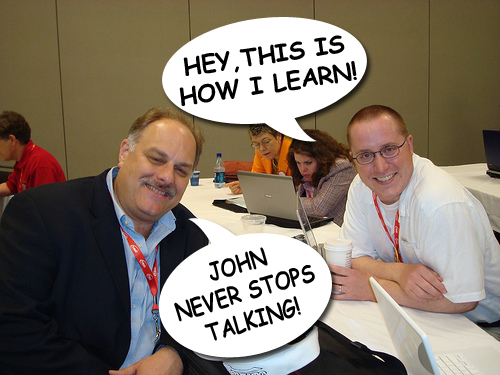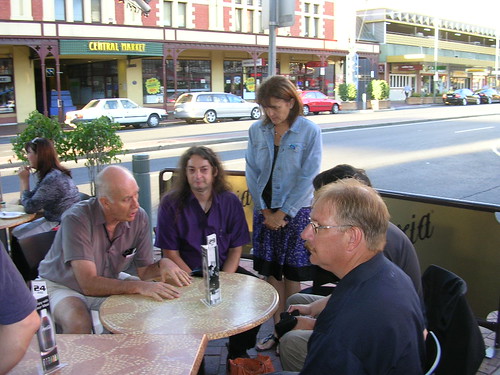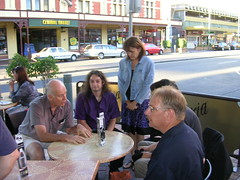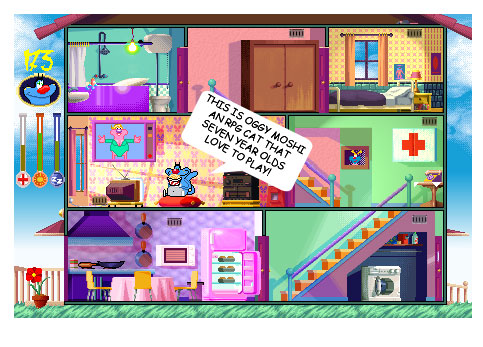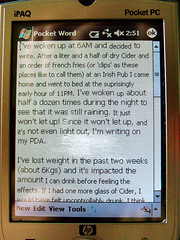These are my notes from today's session with Jenny Gore which was organised by several principals, who closed their schools for the day and assembled over 200 teachers here at Morphettville Racecourse here in Adelaide. The notes are raw, direct extractions from Jenny's slides and speech - any of my own reflections will be in italics. Feel free to ignore this post as the notes will make much more sense to me than any external reader who wasn't there today - but you may find nuggets that ring true as well!
Quality Teaching: Background and Overview
In context - authentic pedagogy, productive pedagogy, quality teaching.
Referred to Queensland work on Productive Pedagogies – research team went into schools that were innovative to examine what was working, started with authentic as the base for the Productive Pedagogies, learning styles is had to measure in improved outcomes (interesting point - Jenny pointed out that in Australia, education had taken MI beyond what Howard Gardner intended and labelled kids as particular types of learners, all Gardner wanted to point out was that there were different styles of learning, not that one style is the sole way someone learns) so PP was a researchers model while QT model is designed as a teachers’ model. Dimensions of QT - intellectual quality, quality learning environment, significance. All dimensions work together as a package; you can’t implement one after the other.
Pedagogy = Instruction + Assessment.
What we ask of students is critical, “sinking to the occasion” is the result if we don’t place high demands on students.
Based on sound and broad research, it is a framework (a lens to look at what you are doing), it is generic (and requires translation to each individual teachers’ role), builds on what teachers already know and do, provides concepts and language to talk and reflect on practice, it’s a model (everything must be in their place, all parts fitting)
Interesting that US data is used as research justification for an Australian framework.
Schools contribute to the inequality in society - strong correlation between engagement and intellectual quality. Secondary school assessment tasks one of a higher quality than primary, but primary schools have higher intellectual quality than their secondary counterparts. Teachers’ dispositions and beliefs directly influence the quality of outcomes for their students. No relationship between years of experience to quality results.
Collaborative planning time is a major factor. Differences between classes are greater then the differences between schools. Quality of what we deliver directly affects their outcomes.
What is Intellectual Quality? Deep knowledge, deep understanding, problematic knowledge, high order thinking, metalanguage and substantive communication. Key point of deep knowledge is - what do you want them to learn? Why does it matter? Between the topic and the outcome is what we want the students to learn. All knowledge is constructed from different perspectives - it is problematic. Applies to knowledge -where does it come from? Knowledge is open to question. Lots of work has been done on thinking one the past decade. Lower order thinking is vitally important but is a problem if that is all that is done. High order thinking must connect to deep understanding, the main ideas or it can be worthless. Metalanguage is the language about language. Substantive communication is sustained over time on the subjects of curriculum, teachers listening differently and asking elaborative questions, applies to written and expressive work
What is quality learning environment? Explicit quality criteria, engagement, high expectations, social support, students’ self-regulation, student direction. Expect kids to justify their choices, show them or tell then what is expected, you feel engagement more than an observe can see it, high expectations are crucial to student success, ask more, how much time spent on behavior takes away from instruction and learning, giving some control for their learning over to the student but giving all over to the student is irresponsible.
What is significance? Background knowledge, cultural knowledge, knowledge integration, inclusivity, connectedness and narrative. Making connections of diverse fragments through deep knowledge. Classrooms need to be inclusive environments. Connected tasks of relevance, when is it useful to have an audience, power of stories to enrich learning.
Use planning time well: In relation to QT ask the following questions:
What do I want students to learn?
Why does learning matter?
What am I going to get the students to produce?
How well do I expect them to do it?
Coding Exercise using Teacher video sample.
We watched a 15 minute condensed lesson from an Art lesson and then coded the lesson according to the eighteen identified elements for the QT framework.
This was an interesting exercise as we had to refer to a 1 to 5 numbering system to grade various aspects of the lesson on the video. I started making notes (I had left my booklets for the session at home) but after Annabel lent me her copy, I made steady progress. Looking at another's teacher's work is really challenging as I started recognising deficiencies and areas to work on within my own classroom practice. The 18 elements really got me thinking about the whole overall practice of teaching - and how important the teaching aspect is to ensuring the success for kids. Too much structure and the kids never get to think for themselves or make choices and expecting them to choose and learn without interference is setting them up for failure in the primary school setting and as Jenny reminded us, is professionally irresponsible. I thought about the Personal Research Projects my class are doing and how they really need some explicit steps and expectations spelt out to them. If the essential learning for that project is learning how to find information, extract and verify it, then present it back to their peers using some pre-determined skills and methods, then that needs to be explicitly taught and all expectations laid out clearly so that all students can experience success in gaining those skills.
Jenny brought us back to the session after our lunch break with this set of dot points:
Quality Teaching not as an extra
Doing what you already do, differently.
Doing what you already do, better.
Doing what you already do, more aware.
Afternoon Coding Exercise on the Assessment task coding sheet.
I tackled this task with my principal and her student-teacher niece and we had to analyse a performance task based on Harry Potter according to the 14 criteria (4 less because it was a written task not a teaching performance). Again, this was easier because we were able to chat and discuss our choices. This was important because then we were able to get our head around what each section entailed - Problematic Knowledge was certainly an area that is not easy to define and then judge.
After that exercise we had to sum up with a statement about one thing we would take away from the day. Around our table, we ran out of time to hear my little blurb so I'll post it here - "I need to plan more effectively and only offer relevant activities/lessons/tasks to my class" - the framework can be a really effective tool in this regard and fits well with the UbD planning our school has embraced.
